Resources for Further Reading
We consulted many books while working on the Decolonization issue. Here are just a few that you may be interested in reading.
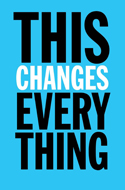 Naomi Klein’s latest book, This Changes Everything: Capitalism vs. The Climate (2014), is an activist call to arms for the 21st century. It’s not overtly an anti-colonial manifesto, but it shows how climate justice is impossible without hearing Indigenous voices and respecting treaty rights. Klein also demonstrates the legal potential of fighting fossil fuel corporations based on treaty agreements.
Naomi Klein’s latest book, This Changes Everything: Capitalism vs. The Climate (2014), is an activist call to arms for the 21st century. It’s not overtly an anti-colonial manifesto, but it shows how climate justice is impossible without hearing Indigenous voices and respecting treaty rights. Klein also demonstrates the legal potential of fighting fossil fuel corporations based on treaty agreements.
 In A People’s History of the United States (1980), Howard Zinn literally rewrites the history books, but this time from the perspective of women, the working poor, African Americans, Native Americans, and immigrants. This is required reading for anyone who thinks they already know U.S. history.
In A People’s History of the United States (1980), Howard Zinn literally rewrites the history books, but this time from the perspective of women, the working poor, African Americans, Native Americans, and immigrants. This is required reading for anyone who thinks they already know U.S. history.
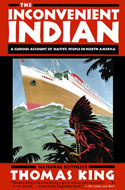 Thomas King undertakes a similar historical retelling in The Inconvenient Indian: A Curious Account of Native People in North America (2012), but he writes with the prose and wit of storyteller, and the book is more cultural memoir, less rigorous chronology.
Thomas King undertakes a similar historical retelling in The Inconvenient Indian: A Curious Account of Native People in North America (2012), but he writes with the prose and wit of storyteller, and the book is more cultural memoir, less rigorous chronology.
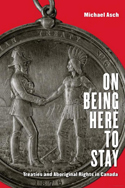 On Being Here To Stay (2014) by Michael Asch looks at the legal relationship between the Aboriginal Peoples of Canada and the federal government, and he proposes a way forward based on the “spirit and intent” of treaties negotiated at the time of confederation.
On Being Here To Stay (2014) by Michael Asch looks at the legal relationship between the Aboriginal Peoples of Canada and the federal government, and he proposes a way forward based on the “spirit and intent” of treaties negotiated at the time of confederation.
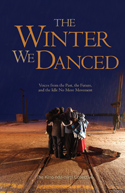 In even more recent history, The Winter We Danced (2014) is a collection of writing, poetry, lyrics, art, and images that came out of the Idle No More movement. It’s a hopeful, rich, and instructive account of popular resurgences, edited by an Indigenous collective.
In even more recent history, The Winter We Danced (2014) is a collection of writing, poetry, lyrics, art, and images that came out of the Idle No More movement. It’s a hopeful, rich, and instructive account of popular resurgences, edited by an Indigenous collective.
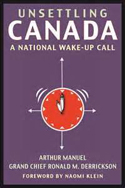 Unsettling Canada: A National Wake-up Call (2015) by Arthur Manuel and Grand Chief Ronald M. Derrickson tells the story of Canada’s relationship with Indigenous people from the perspective of a life-long activist and leader. Manuel calls for a multi-faceted approach to Indigenous sovereignty including grassroots activism, legal battles, and economic development.
Unsettling Canada: A National Wake-up Call (2015) by Arthur Manuel and Grand Chief Ronald M. Derrickson tells the story of Canada’s relationship with Indigenous people from the perspective of a life-long activist and leader. Manuel calls for a multi-faceted approach to Indigenous sovereignty including grassroots activism, legal battles, and economic development.
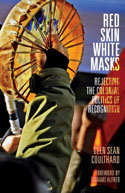 Red Skin White Masks: Rejecting the Colonial Politics of Recognition (2014) by Glen Coulthard challenges the assumption that acknowledgment of past wrongs and recognition of cultural differences is sufficient for reconciliation between Indigenous people and the state. Coulthard leans on Karl Marx and Frantz Fanon to present an alternative theory of reconciliation based on Indigenous cultural practices and self-recognition rather than colonial appreciation.
Red Skin White Masks: Rejecting the Colonial Politics of Recognition (2014) by Glen Coulthard challenges the assumption that acknowledgment of past wrongs and recognition of cultural differences is sufficient for reconciliation between Indigenous people and the state. Coulthard leans on Karl Marx and Frantz Fanon to present an alternative theory of reconciliation based on Indigenous cultural practices and self-recognition rather than colonial appreciation.
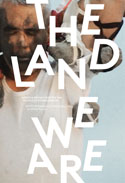 The Land We Are (2015), edited by Gabrielle L’Hirondelle Hill and Sophie McCall, does similar important work, but in coffee-table format, through the voices of artists and activists.
The Land We Are (2015), edited by Gabrielle L’Hirondelle Hill and Sophie McCall, does similar important work, but in coffee-table format, through the voices of artists and activists.
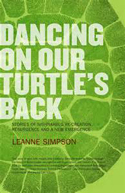 Leanne Simpson approaches Indigenous resurgence through language and the arts. In Dancing On Our Turtle’s Back (2011) she theorizes Native resurgence from within Nishnaabeg language and thought, and in Islands of Decolonial Love (2013) she does so through stories and songs (in print and on tape).
Leanne Simpson approaches Indigenous resurgence through language and the arts. In Dancing On Our Turtle’s Back (2011) she theorizes Native resurgence from within Nishnaabeg language and thought, and in Islands of Decolonial Love (2013) she does so through stories and songs (in print and on tape).
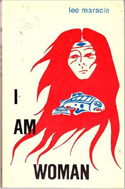 As is often the case when thinking about social justice, decolonization is intersectional – that is, it overlaps with many other fields. I Am Woman (1996) by Lee Maracle offers a Native woman’s insights on sociology and feminism, and demonstrates the importance of hearing from many different voices.
As is often the case when thinking about social justice, decolonization is intersectional – that is, it overlaps with many other fields. I Am Woman (1996) by Lee Maracle offers a Native woman’s insights on sociology and feminism, and demonstrates the importance of hearing from many different voices.
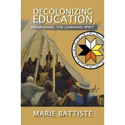 In Decolonizing Education: Nourishing the Learning Spirit (2013), Marie Battiste documents the inherent racism of eurocentric education models and proposes a new model which holds Indigenous humanities, sciences, and languages as valuable fields of knowledge.
In Decolonizing Education: Nourishing the Learning Spirit (2013), Marie Battiste documents the inherent racism of eurocentric education models and proposes a new model which holds Indigenous humanities, sciences, and languages as valuable fields of knowledge.
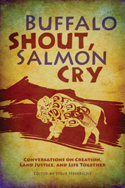 Christians who want to engage with Indigenous thought are not without resources, but it’s important to first recognize the colonial impulses of most Christian theology. With essays and responses from both Christian and Indigenous thinkers, Buffalo Shout, Salmon Cry: Conversations on Creation, Land Justice, and Life Together (2013) is an invaluable resource and a great place to start. It’s edited by Steve Heinrichs (one of the guest editors for this issue of Geez), who also edits Intotemak, a quarterly newsletter published by Mennonite Church Canada.
Christians who want to engage with Indigenous thought are not without resources, but it’s important to first recognize the colonial impulses of most Christian theology. With essays and responses from both Christian and Indigenous thinkers, Buffalo Shout, Salmon Cry: Conversations on Creation, Land Justice, and Life Together (2013) is an invaluable resource and a great place to start. It’s edited by Steve Heinrichs (one of the guest editors for this issue of Geez), who also edits Intotemak, a quarterly newsletter published by Mennonite Church Canada.
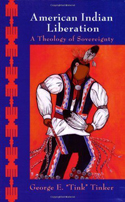 Tink Tinker, a member of the Osage Nation, an ordained Lutheran minister, and a professor at the Iliff School of Theology, has written several books, including American Indian Liberation: A Theology of Sovereignty (2008), that develop Native American liberation theologies in conversation with Christian traditions.
Tink Tinker, a member of the Osage Nation, an ordained Lutheran minister, and a professor at the Iliff School of Theology, has written several books, including American Indian Liberation: A Theology of Sovereignty (2008), that develop Native American liberation theologies in conversation with Christian traditions.
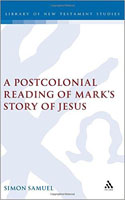 Simon Samuel’s A Postcolonial Reading of Mark’s Story of Jesus (2007) is an example of “postcolonial theology.” Though the field can tend towards ivory-tower type theorizing, it’s important nonetheless to reconsider Christian narratives with the blind spot of colonial supremacy in mind.
Simon Samuel’s A Postcolonial Reading of Mark’s Story of Jesus (2007) is an example of “postcolonial theology.” Though the field can tend towards ivory-tower type theorizing, it’s important nonetheless to reconsider Christian narratives with the blind spot of colonial supremacy in mind.
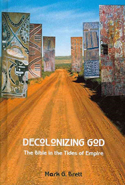 Similarly, in Decolonizing God: The Bible in the Tides of Empire (2008), Mark G. Brett re-examines land rights, genocide, and other topics of the Old and New Testaments to allow biblical and post-colonial studies to inform each other.
Similarly, in Decolonizing God: The Bible in the Tides of Empire (2008), Mark G. Brett re-examines land rights, genocide, and other topics of the Old and New Testaments to allow biblical and post-colonial studies to inform each other.
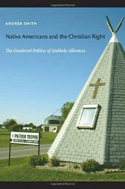 In Native Americans and the Christian Right (2008), Andrea Smith analyzes unlikely “cowboys and indians” alliances between evangelicals and Native Americans, in an effort to reach a less partisan understanding of the role of religion in social justice movements.
In Native Americans and the Christian Right (2008), Andrea Smith analyzes unlikely “cowboys and indians” alliances between evangelicals and Native Americans, in an effort to reach a less partisan understanding of the role of religion in social justice movements.
 In Shalom and the Community of Creation (2012) Randy Woodley invites Christians to view creation and read scripture through an Indigenous lens. In his words, “Native Americans have been the recipients of American church mission longer than an other people in the world. We have scrutinized the message and the messengers and we have something to say.”
In Shalom and the Community of Creation (2012) Randy Woodley invites Christians to view creation and read scripture through an Indigenous lens. In his words, “Native Americans have been the recipients of American church mission longer than an other people in the world. We have scrutinized the message and the messengers and we have something to say.”
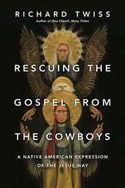 For the evangelicals in our midst, Richard Twiss was a popular Native American educator and activist. His book Rescuing the Gospel from the Cowboys: A Native American Expression of the Jesus Way attempts to offer a corrective to the legacy of Christian colonialism and reframe the gospel story in light of Native American culture and experience.
For the evangelicals in our midst, Richard Twiss was a popular Native American educator and activist. His book Rescuing the Gospel from the Cowboys: A Native American Expression of the Jesus Way attempts to offer a corrective to the legacy of Christian colonialism and reframe the gospel story in light of Native American culture and experience.

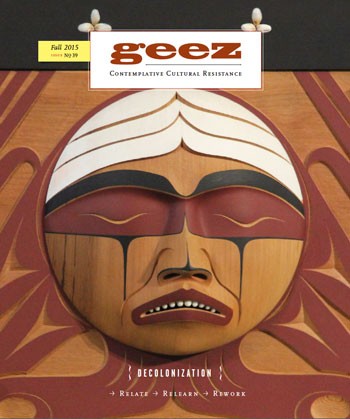

Sorry, comments are closed.